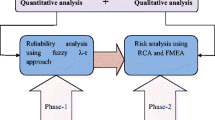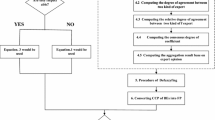Abstract
The aim of this work is to study the performance issues of cooling tower unit of a coal fired thermal power plant. The complex series- parallel arrangement of repairable system has been modeled with Petri-Net (PN) approach. Reliability parameters of the considered system have been tabulated using fuzzy Lambda-Tau approach. Triangular Membership Function (TFN) has been used for considering the vagueness in the collected operational failure rate and repair time data. Failure dynamics of the considered system was studied on the basis of increasing and decreasing trend of reliability parameters. The analysis result has been supplied to the maintenance engineer of the plant to fix the optimum maintenance interval for the considered unit.
Access this chapter
Tax calculation will be finalised at checkout
Purchases are for personal use only
Similar content being viewed by others
References
Panchal D, Kumar D (2017) Risk analysis of compressor house unit of thermal power plant. Int J Ind Syst Eng 25(2):228–250
Sharma RK, Sharma P (2012) Integrated framework to optimize RAM and cost decision in process plant. J Loss Prevent Process Ind 25:883–904
Panchal D, Singh AK, Chatterjee P, Zavadskas EK, Ghorabaee MK (2019) A new fuzzy methodology-based structured framework for RAM and risk analysis. Appl Soft Comput 74:242–254
Panchal D, Srivastva P (2018) Qualitative analysis of CNG dispensing system using fuzzy FMEA–GRA integrated approach. Int J Syst Assur Eng Manag. https://doi.org/10.1007/s13198-018-0750-9
Arora N, Kumar D (1997) Availability analysis of steam and power generation systems in thermal power plant. Int J Microelectr Reliab 37:795–799
Arora N, Kumar D (2000) Stochastic analysis and maintenance planning of ash handling system in thermal power plant. Int J Microelectr Reliab 37(5):819–834
Gupta P, Lal A, Sharma R, Singh J (2005) Numerical analysis of reliability and availability of series processes in butter oil processing plant. Int J Qual Reliab Manag 22(3):303–306
Gupta P, Lal AK, Sharma RK, Singh J (2007) Analysis of reliability and availability of serial processes of plastic-pipe manufacturing plant: a case study. Int J Qual Reliab Manag 24(4):404–419
Sharma RK, Kumar D, Kumar P (2007) Modeling system behavior for risk and reliability analysis using KBARAM. Qual Reliab Eng Int 23:973–998
Panchal D, Kumar D (2014) Reliability analysis of CHU system of coal fired thermal power plant using fuzzy λ-τ approach. Proc Eng 97:2323–2332
Garg H (2014) Performance and behavior analysis of repairable industrial systems using vague Lambda-Tau methodology. Appl Soft Comput 22:323–328
Panchal D, Kumar D (2016) Integrated framework for behavior analysis in a process plant. J Loss Prevent Process Ind 40:147–161
Kokso B (1999) Fuzzy engineering. Prentice Hall, Englewood Cliffs
Tanaka K (2001) An introduction to fuzzy logic for practical applications. Springer, New York
Zadeh LA (1996) Fuzzy sets, fuzzy logic, fuzzy systems: selected papers. World Scientific, Singapore
Zimmermann H (1996) Fuzzy set theory and its applications, 3rd edn. Kluwer Academic Publishers
Ross TJ (2000) Fuzzy logic with engineering applications. McGraw-Hill, New York, NY
Panchal D, Kumar D (2016) Stochastic behaviour analysis of power generating unit in thermal power plant using fuzzy methodology. OPSEARCH 53(1):16–40
Panchal D, Mangala S, Tyagi M, Mange R (2018) Risk analysis for clean and sustainable production in a urea fertilizer industry. Int J Qual Reliab Manag 35(7):1459–1476
Knezevic J, Odoom ER (2001) Reliability modeling of repairable systems using petri nets and fuzzy lambda-tau methodology. Reliab Eng Syst Saf 73(1):1–17
Author information
Authors and Affiliations
Corresponding author
Editor information
Editors and Affiliations
Rights and permissions
Copyright information
© 2020 Springer Nature Switzerland AG
About this chapter
Cite this chapter
Panchal, D., Tyagi, M., Sachdeva, A., Garg, R.K. (2020). Reliability Analysis of Complex Repairable System in Thermal Power Plant. In: Ram, M., Pham, H. (eds) Advances in Reliability Analysis and its Applications. Springer Series in Reliability Engineering. Springer, Cham. https://doi.org/10.1007/978-3-030-31375-3_12
Download citation
DOI: https://doi.org/10.1007/978-3-030-31375-3_12
Published:
Publisher Name: Springer, Cham
Print ISBN: 978-3-030-31374-6
Online ISBN: 978-3-030-31375-3
eBook Packages: EngineeringEngineering (R0)




